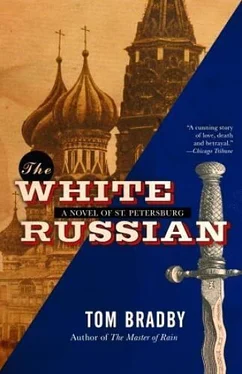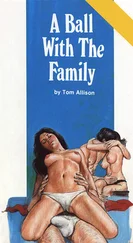“Perhaps you should leave him.”
Ruzsky spun around. His father stood quite still in the hallway, apparently unchanged by these past three years. He was an older and more distinguished version of his eldest son. He was no taller than Ruzsky and not much broader, but he carried about him the gravity of his wealth and position.
His mustache was completely white now and drooped neatly around the edges of his mouth. His hair was longer than usual, but also a distinctive silver-white. Neatly brushed across his forehead, it was wavy and thick. If only you were as handsome as your father, Irina had once said to him with a sigh.
Today, Russia ’s assistant minister of finance wore a morning suit, his gold pocket-watch chain looped across the front of a dark waistcoat, highly polished boots catching what little light filtered through the window.
“I’m sorry?” Ruzsky asked. He felt his face flushing.
“He’s your son. It’s your choice.”
“What is?”
“Whether to see him.”
Ruzsky faced the window again. Michael had discarded his hat and was standing in the middle of the garden staring at the gray sky. “Why is that a choice?” he asked.
Irina emerged from the kitchen below and hurried toward their son. She tried to shoo him back inside, but he was reluctant to come. She picked up Michael’s hat and forced it onto his head.
Irina was not an unattractive woman. Her dark hair had been recently cut and styled to frame her narrow face. She glanced up briefly, but did not appear to see him.
“Perhaps you should give him more time.”
“Time for what?”
“To settle in.”
Ruzsky had forgotten how much authority his father carried in his voice. “To settle in where?” he asked.
“You know perfectly well what I mean.”
Ruzsky watched as Michael finally allowed himself to be led by his mother back into the house. He heard the door being shut below and could dimly make out the sound of their voices in the kitchen.
“Fatherhood carries responsibilities.”
Ruzsky turned and, as he did so, caught sight of a wooden train in the corner of the doorway to his father’s study, by the base of a large palm tree. “What do you mean by that?”
“Sometimes you have to act in the best interests of the child, and not of your own.”
“And what are the best interests of my child?”
The elder Ruzsky gazed solemnly at his son. His face was deeply lined, his forehead creased by a severe frown. “If she finds you here, there will be a confrontation.”
Ruzsky stared at the train. It was part of a set his father had commissioned for him on his seventh birthday from St. Petersburg ’s leading toymaker. Once, they had enjoyed playing with it together in the attic room at the top of the house.
Ruzsky forced himself to meet his father’s glare. “He would be better off without me. Is that what you think?”
There was no reply and Ruzsky felt the weight of the past upon him. He was no longer the chief investigator of the Petrograd Police Department, but a frightened eleven-year-old boy in the study at Petrovo.
Ruzsky lowered his eyes and kept them fixed on the train as he fought to contain his emotions. He breathed in deeply. “Can a man never escape his past mistakes?” he asked.
The elder Ruzsky did not flinch, his eyes fixed upon his son. “It is the boy’s welfare that concerns me now.”
He turned around and walked slowly toward the study door. At its entrance, he bent down to pick up the wooden train engine and then, without a further glance, shut the door behind him, leaving Ruzsky alone in the corridor.
The house was silent.
Ruzsky heard a banging sound below, like a wooden bowl being hammered on a table. One of his father’s Great Danes gave a single bark and then was quiet.
Ruzsky waited. Ever since Ilusha’s death, his life had been about that closed door. He wanted to move beyond it, but felt paralyzed once again.
He could hear the sound of the Tompion clock on the mantelpiece in the drawing room.
He recalled the dark winter afternoons of his childhood, marked out by the steady, rhythmic ticking of that clock. It was the sound of the inflexible regimentation of his father’s world.
Ruzsky closed his eyes and let himself return to that day at Petrovo. He could almost feel the icy water’s embrace as his mind drifted toward a place that he knew deep in his heart would end the pain and guilt forever.
His father had instructed him to make sure that Ilusha did not play on the ice now that spring was upon them. And even if he had not been there at the moment his little brother had made those fateful steps, even if he could have claimed that it was not his fault and that he had heard the cry and run to the lake and dived in and done his best to save him, there was no one who blamed Ruzsky more than he blamed himself.
He should have gone with Ilusha.
It was snowing heavily when Ruzsky emerged, but he didn’t take this or his surroundings in, until he had reached the corner of the Nevsky Prospekt. He stood on the street corner opposite the Alexander Garden, now, in winter, just dark, skeletal trees reaching for the sky, and tilted his face upward.
He tasted the flakes as they fell.
A detachment of soldiers in long greatcoats marched past him, then wheeled right onto the Nevsky. Ruzsky recognized them as members of the Semenovsky Regiment, though they hardly did justice to its reputation. They looked scruffy and marched without any of the precision that would have accompanied them before the war, when no regiment had moved anywhere in Petersburg unless immaculately turned out and in perfect order.
Ruzsky thought for a moment of the painted soldiers he had kept neatly in boxes in his attic room in the house in Millionnaya Street. He wondered if they were still there, and if Michael played with them, also. The contrast with the St. Petersburg of his childhood was pervasive. It was the first day of the New Year, but he was certain there would be no reception in the great halls of the Winter Palace.
Aside from the soldiers, the capital’s main thoroughfare was almost deserted. Two private sleds waited outside the Wolf and Beranger Café and, beyond them, a motor car was clanking noisily in his direction.
Ruzsky pulled out his pocket watch. It was not yet ten o’clock in the morning; the city was only slowly coming to life.
He continued noticing that this section of the city had borne few physical changes. The huge windows of Alexandre’s were packed with scarves of woven Persian silk, jade, ivory, leather goods of all descriptions, and jewels beyond the imagination of most passersby. Druce’s, the famed magasin anglais, still had Harris Tweed and English soaps in its smaller windows, and Cabassue’s had fine French silk ties and linen along with fashionable botinky, the low-cut velvet boots with rubber soles so favored by the rich. All the stores had signs declaring “English spoken” or “Ici on parle français,” though, of course, they had all lost the once common “Man spricht Deutsch.”
Ruzsky stopped dead. He had reached Wolff’s, the capital’s largest bookstore and his favorite as a child. The latest casualty lists from the front were posted in the window. The names stretched for column after column.
He read through them all.
Ruzsky turned around, deep in thought. Beyond the shop, tucked into the corner of the wall, was a bearded Circassian in traditional sheepskin coat, his wares-mostly silver bangles and brooches-spread out on a colored rug.
The man was clutching the cape around him, head bent. These traders were a commonplace sight in summer on the Nevsky, but Ruzsky had never before seen one here in winter.
T he city police department was housed in a grand, classical building situated on Ofitserskaya Ulitsa- Officers Street -not far from the Mariinskiy Theatre. Pavel was waiting for him by the gate and the pair strolled in through the side arch of the courtyard, past a group of horses being exercised in a tight circle. Behind them, men from the transport department had already hauled out sleds and carriages from the garage, ready to be hitched up.
Читать дальше












